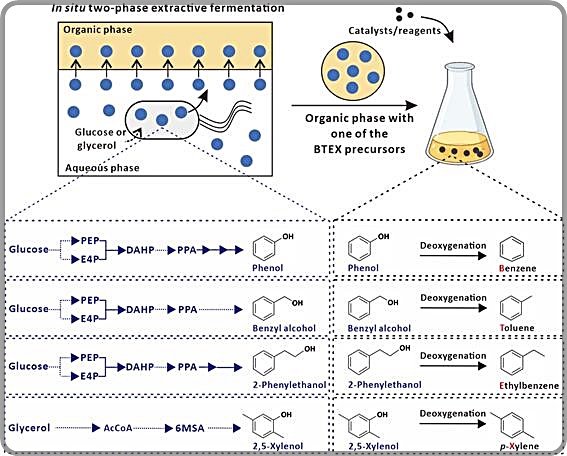
Biotech
KAIST Team Extracts PET Ingredients from Microbes
Dong-A Ilbo |
Updated 2025.10.13
Successful Production from Renewable Bio-Feedstock
Opens Possibility for Eco-Friendly Plastic Production
Opens Possibility for Eco-Friendly Plastic Production
ⓒNewsis
KAIST research team has succeeded in obtaining benzene, toluene, ethylbenzene, and paraxylene (BTEX), which were previously only obtainable through petroleum refining, from bio-based materials. This achievement is evaluated as opening the possibility for reducing petroleum dependency and producing eco-friendly plastic raw materials through bio-processes.According to KAIST on the 12th, a joint research team led by Distinguished Professor Sang Yup Lee from the Department of Chemical and Biomolecular Engineering and Professor Soon Gyu Han from the Department of Chemistry has recently developed a process that produces BTEX from renewable bio-based materials such as glucose and glycerol by combining microbial fermentation processes with organic chemical reactions. The process involves microorganisms using glucose and glycerol to create oxygenated intermediates like phenol and benzyl alcohol, which are then chemically reacted to remove oxygen and obtain BTEX.
BTEX is a key raw material for products used in everyday life, such as PET bottles, Styrofoam, and nylon, and until now, it could only be obtained through petroleum refining. This has posed significant environmental burdens, but due to its complex chemical structure, plant-based BTEX has been difficult to produce.
However, the KAIST research team has solved this challenge with their new process. The research findings were published on the 2nd in the 'Proceedings of the National Academy of Sciences (PNAS)', issued by the National Academy of Sciences (NAS) in the United States. Professor Lee stated, "The demand for BTEX is continuously increasing worldwide," and added, "This achievement represents a significant advancement in enabling the supply of sustainable raw materials."
Kim Ha-gyeong
AI-translated with ChatGPT. Provided as is; original Korean text prevails.
ⓒ dongA.com. All rights reserved. Reproduction, redistribution, or use for AI training prohibited.
Popular News











